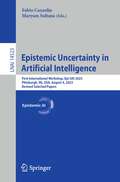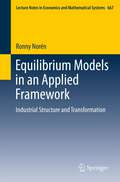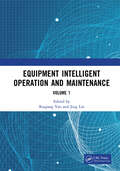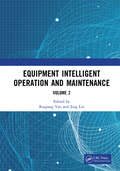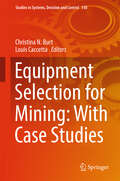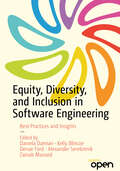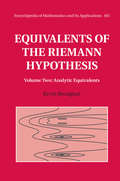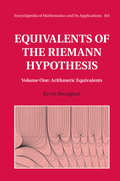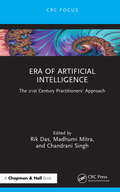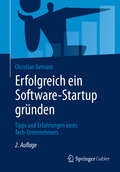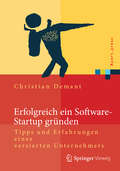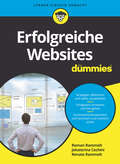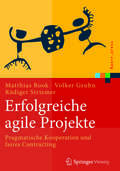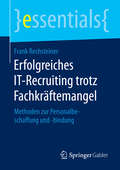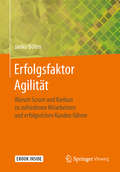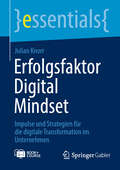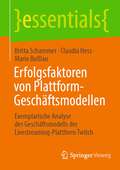- Table View
- List View
Epistemic Uncertainty in Artificial Intelligence: First International Workshop, Epi UAI 2023, Pittsburgh, PA, USA, August 4, 2023, Revised Selected Papers (Lecture Notes in Computer Science #14523)
by Fabio Cuzzolin Maryam SultanaThis LNCS 14523 conference volume constitutes the proceedings of the First International Workshop, Epi UAI 2023, in Pittsburgh, PA, USA, August 2023. The 8 full papers together included in this volume were carefully reviewed and selected from 16 submissions. Epistemic AI focuses, in particular, on some of the most important areas of machine learning: unsupervised learning, supervised learning, and reinforcement learning.
Equilibrium Models in an Applied Framework
by Ronny NorénThis book gives the historical development, explanations of technical specifications, and a basic understanding of how to use different equilibrium models in an applied framework. It contains an accessible analytical survey of economic equilibrium models, including multi-sector programming models (linear and quadratic) and the computable general equilibrium (CGE) model. The book introduces the importance of disinvestment, and hence, a model of economic transformation is developed. Finally, the globalisation process of the production system is examined. The equilibrium models in this book are presented in an easy way. Although the book is primarily written for advanced undergraduates and beginning graduates, the reading of the book will appeal to anyone interested in economic theory and applied modelling in the field of economics.
Equipment Intelligent Operation and Maintenance: Proceedings of the First International Conference on Equipment Intelligent Operation and Maintenance (ICEIOM 2023), Hefei, China, 21st – 23rd September, 2023 (Volume I)
by Ruqiang Yan Jing LinThe proceedings of the First International Conference on Equipment Intelligent Operation and Maintenance (ICEIOM 2023) offer invaluable insights into the processes that ensure safe and reliable operation of equipment and guarantee the improvement of product life cycles.The book touches upon a wide array of topics including equipment condition monitoring, fault diagnosis, and remaining useful life prediction. With special emphasis on the integration of big data and machine learning, the papers contained in this publication highlight how these technologies make the equipment operation process highly automated and ingenious. Intelligent operation and maintenance is set to act as the driving force behind a new generation of smart manufacturing and equipment upgradation, and promote demand for intelligent product services and management.This is a highly beneficial guide to students, researchers, working professionals and enthusiasts who wish to stay updated on innovative research contributions and practical applications of state-of-the-art technologies in equipment operation and maintenance.
Equipment Intelligent Operation and Maintenance: Proceedings of the First International Conference on Equipment Intelligent Operation and Maintenance (ICEIOM 2023), Hefei, China, 21st – 23rd September, 2023 (Volume II)
by Ruqiang YanThe proceedings of the First International Conference on Equipment Intelligent Operation and Maintenance (ICEIOM 2023) offer invaluable insights into the processes that ensure safe and reliable operation of equipment and guarantee the improvement of product life cycles.The book touches upon a wide array of topics including equipment condition monitoring, fault diagnosis, and remaining useful life prediction. With special emphasis on the integration of big data and machine learning, the papers contained in this publication highlight how these technologies make the equipment operation process highly automated and ingenious. Intelligent operation and maintenance is set to act as the driving force behind a new generation of smart manufacturing and equipment upgradation, and promote demand for intelligent product services and management.This is a highly beneficial guide to students, researchers, working professionals and enthusiasts who wish to stay updated on innovative research contributions and practical applications of state-of-the-art technologies in equipment operation and maintenance.
Equipment Selection for Mining: With Case Studies (Studies in Systems, Decision and Control #150)
by Christina N. Burt Louis CaccettaThis unique book presents innovative and state-of-the-art computational models for determining the optimal truck–loader selection and allocation strategy for use in large and complex mining operations. The authors provide comprehensive information on the methodology that has been developed over the past 50 years, from the early ad hoc spreadsheet approaches to today’s highly sophisticated and accurate mathematical-based computational models. The authors’ approach is motivated and illustrated by real case studies provided by our industry collaborators. The book is intended for a broad audience, ranging from mathematicians with an interest in industrial applications to mining engineers who wish to utilize the most accurate, efficient, versatile and robust computational models in order to refine their equipment selection and allocation strategy. As materials handling costs represent a significant component of total costs for mining operations, applying the optimization methodology developed here can substantially improve their competitiveness
Equipment as a Service-Modelle im B2B-Geschäft: Eine Einordnung verschiedener Modelle und Analyse möglicher Erfolgsfaktoren (BestMasters)
by Stella SchneiderNach dem Einzug von Everything as a Service-Modellen in der IT-Branche, tauchen diese nun auch in der Industrie auf. Equipment as a Service (EaaS) birgt das Potenzial die Kundenzentriertheit, den Erfolg und die Nachhaltigkeit eines Unternehmens zu erhöhen und bestehende Angebote zu reformieren. Allerdings erfordert dies starke Veränderungen im ganzen Unternehmen, denn die Bereitstellung von EaaS-Modellen ist besonders komplex. Das Ziel dieses Buchs ist es, diese Komplexität zu reduzieren und Erfolgsfaktoren für die Bereitstellung von EaaS-Modellen zu identifizieren. Zunächst erfolgt eine Einordnung der verschiedenen EaaS-Modelle anhand einer Literaturrecherche. Dazu können verschiedene charakteristische Merkmale, wie das Erlösmodell, der Reifegrad oder das angebotene Equipment herangezogen werden. Als Nächstes werden durch Experteninterviews Erfolgsfaktoren für alle Elemente eines EaaS-Geschäftsmodells ermittelt. Insgesamt werden 39 Erfolgsfaktoren in 10 Kategorien identifiziert, deren Wirkungsrelationen betrachtet und bewertet sowie die Relevanz der weichen Faktoren festgestellt.
Equity, Diversity, and Inclusion in Software Engineering: Best Practices and Insights
by Alexander Serebrenik Daniela Damian Kelly Blincoe Denae Ford Zainab MasoodCreating an inclusive environment where different software developers can feel welcome and leverage their talents is an ethical imperative no company can ignore. Indeed, software organizations have in the last decade been trying to make changes for a more diverse and inclusive software development environment. The push for increased diversity in software has been a public one, from annual diversity reports by some of the worlds’ most visible companies such as Microsoft, Google, and Facebook, to large projects such as Linux Foundation’s Software Developer Diversity and Inclusion project that explores, evaluates, and promotes best practices from research and industry to increase diversity and inclusion in software engineering. Despite these many efforts, diversity remains low. Numbers from the software industry show that less than 25% of software engineers are women. Diversity is also low in regards to many other facets of diversity. This book provides an overview of research into the different aspects of diversity and inclusion in software engineering, as well as the tools, methods, and practices proposed to foster diversity and to build inclusive software teams and development environments. It describes research challenges in studying diversity and inclusion in software. Readers will be challenged to consider how they are contributing to a lack of inclusion and what they can do to improve inclusion in the software industry.What You Will Learn Aspects of diversity (e.g., age, culture, gender, race) and relationship to software engineering activities and outcomesHow to measure diversity Investigations of intersectionality in software engineering Research methods for the study of diversity and inclusion in software engineering Empirical studies of effective practices to foster diversity and inclusion in software engineering Interventions and programs that have been used to successfully support retention in software engineering Software engineering education for diverse and inclusive software engineering, and proven teaching methods/environments that support diverse and inclusive software engineering Who This Book Is For For Researchers, the book presents a state-of-the-art collection of existing studies into many aspects of diversity, methods, and tools proposed and tried out in practice, challenges in research, and contributing to a research agenda on this topic for future studies. For Industry practitioners, the book describes efforts to investigate diversity in software teams, whether in corporate or open source environments. It also describes empirical evidence about effectiveness of certain methods and approaches to foster diversity and inclusion in software development. For Educators,the book describes practices and effective changes in Computer Science/Software Engineering curricula that were found as effective in engaging learners from minoritized groups, creating inclusive software teams that are diverse, and which relate to educational material useful for training for diversity, equity, and inclusion.
Equivalents of the Riemann Hypothesis: Analytic Equivalents (Encyclopedia of Mathematics and its Applications #165)
by Kevin BroughanThe Riemann hypothesis (RH) is perhaps the most important outstanding problem in mathematics. This two-volume text presents the main known equivalents to RH using analytic and computational methods. The book is gentle on the reader with definitions repeated, proofs split into logical sections, and graphical descriptions of the relations between different results. It also includes extensive tables, supplementary computational tools, and open problems suitable for research. Accompanying software is free to download. These books will interest mathematicians who wish to update their knowledge, graduate and senior undergraduate students seeking accessible research problems in number theory, and others who want to explore and extend results computationally. Each volume can be read independently. Volume 1 presents classical and modern arithmetic equivalents to RH, with some analytic methods. Volume 2 covers equivalences with a strong analytic orientation, supported by an extensive set of appendices containing fully developed proofs. Gives students and researchers easy access to methods and results. Fully describes approaches to the Riemann hypothesis using arithmetic functions. Provides many unsolved problems suitable for research. Tailored software is freely available online.
Equivalents of the Riemann Hypothesis: Arithmetic Equivalents (Encyclopedia of Mathematics and its Applications #164)
by Kevin BroughanThe Riemann hypothesis (RH) is perhaps the most important outstanding problem in mathematics. This two-volume text presents the main known equivalents to RH using analytic and computational methods. The book is gentle on the reader with definitions repeated, proofs split into logical sections, and graphical descriptions of the relations between different results. It also includes extensive tables, supplementary computational tools, and open problems suitable for research. Accompanying software is free to download. These books will interest mathematicians who wish to update their knowledge, graduate and senior undergraduate students seeking accessible research problems in number theory, and others who want to explore and extend results computationally. Each volume can be read independently. Volume 1 presents classical and modern arithmetic equivalents to RH, with some analytic methods. Volume 2 covers equivalences with a strong analytic orientation, supported by an extensive set of appendices containing fully developed proofs. Gives students and researchers easy access to methods and results. Fully describes approaches to the Riemann hypothesis using arithmetic functions. Provides many unsolved problems suitable for research. Tailored software is freely available online.
Era of Artificial Intelligence: The 21st Century Practitioners’ Approach
by Rik Das Madhumi Mitra Chandrani SinghThis text has attempted to collate quality research articles ranging from A Mathematical Disposition for Neural Nets, to Cognitive Computing, to Quantum Machine Learning, to a Multimodal Emotion Recognition System, to Responsible AI, to AI for Accessibility and Inclusion, to Artificial-Enabled Intelligence Enabled Applications in the sectors of Health, Pharma and Education. Features Focus on AI research and interdisciplinary research that exhibits AI inclusion to a greater degree Focus on application of disruptive technology in the context of the twenty-first century human and machine approach Focus on role of disruptive technology such as cognitive computing, quantum machine learning, IOT enabled-recognition systems Focus on unravelling the powerful features of artificial intelligence for societal benefits including accessibility This volume will cater as a ready reference to an individual’s quest for deep diving into the ocean of artificial intelligence-enabled solution approaches. The book will serve as a useful reference for researchers, innovators, academicians, entrepreneurs, and professionals aspiring to gain expertise in the domain of cognitive and quantum computing, IOT-enabled intelligent systems and so on.
Erfolgreich als Online-Marketing-Manager: Auf diese Soft Skills kommt es an – heute und in Zukunft
by Markus Bockhorni Claudia BeauchampSie sind Online-Marketing-Spezialist und machen sich Gedanken um Ihre ganz persönliche Zukunftssicherung in Zeiten von Künstlicher Intelligenz und Big Data? Sie haben Lust, sich im Online-Marketing weiter zu entwickeln und neue Aufgaben zu übernehmen? Sie wollen verstehen, was den Online-Marketing-Job ausmacht – und zwar nicht in Bezug auf die erforderlichen Hard Skills? Sie wollen wissen, welche sozialen Kernkompetenzen erfolgsentscheidend sind?Dann hilft Ihnen dieses Buch. Dieser Ratgeber zeigt Ihnen, welche Soft Skills und welches Mindset einen exzellenten Online-Marketing-Manager ausmachen – heute und in Zukunft. Lesen Sie, welche Persönlichkeitsmerkmale und Kompetenzen es zu entwickeln gilt, um als Online-Marketing-Manager erfolgreich zu werden und zu bleiben, und wie Sie sich diese aneignen können: Denn Empathie, Kritik- und Teamfähigkeit, Kreativität oder auch agile Denkweisen lassen sich trainieren.Kurzum: Erfahren Sie, was Sie kennen, können und lieben müssen, um als Online-Marketing-Manager Ihre Zukunft zu sichern.
Erfolgreich auf Online-Marktplätzen: Eine Einführung für Unternehmen: Strategien, Ziele und Umsetzung (essentials)
by Anton MackertDieses essential ist eine Einführung für Unternehmen, die über eine Präsenz auf Plattformen wie Amazon, eBay, OTTO.de, Kaufland und Zalando nachdenken oder diese optimieren möchten. Der Autor erläutert die grundlegenden Strategieüberlegungen, die hinter einer Aktivität auf Online-Marktplätzen stehen müssen, sowie die Bedeutung klar definierter Ziele. Zudem erklärt er die Relevanz von Servicestandards und die Anforderungen an Produktlistings, Lagerbestände, Logistik und Kundenservice, sowie die ersten Schritte, um die Produktsichtbarkeit auf Online-Marktplätzen zu erhöhen – und so neue Kunden zu gewinnen. Beispiele zeigen konkret auf, wie Unternehmen ihre Marktposition stärken, ihre Reichweite maximieren, die Kundenzufriedenheit erhöhen und somit langfristige Erfolge erzielen können.
Erfolgreich ein Software-Startup gründen: Tipps und Erfahrungen eines Tech-Unternehmers
by Christian DemantErfahren Sie in diesem Buch, wie sich ein erfolgreiches Software-Startup am Weltmarkt etabliertDie Industrie befindet sich weltweit in einem gewaltigen Umbruch und entwickelt sich immer mehr zur Softwarewelt. Dies steigert die Nachfrage nach IT-Spezialisten rund um den Globus. In Deutschland fehlen in den Unternehmen mittlerweile über 120 000 IT-Experten, in den USA verweisen Vertreter der großen Tech-Konzerne auf 500 000 offene Stellen. Die weltweit hohe Nachfrage nach qualifizierten Entwicklern lässt sich aus Gründersicht geschickt ausnutzen, denn in vielen Unternehmen wird die Frage lauten, ob diese dringend benötigten Ressourcen selbst aufgebaut oder ob mit externen Anbietern kooperiert werden soll. Dieser externe Anbieter könnten zukünftig Sie sein – mit Ihrem neu gegründeten Software-StartupDie zweite Auflage des Buches wurde inhaltlich grundlegend überarbeitet und mit aktuellen Erfahrungen aus der Berater- und Gutachtertätigkeit des Autors erweitert. Diverse Daten und Statistiken wurden aktualisiert und neue Technologien und IT-Trends berücksichtigt. Folgende Themenschwerpunkte werden hier vorgestellt:Chance Selbstständigkeit für MINT-Absolventen mit innovativen Geschäftsideen.Die typischen Fragestellungen vor der Gründung: Teambildung, Kapitalbeschaffung, Rechtsform, Firmensitz und Firmenname.Die Schlagzahl erhöhen: Bewältigen der mentalen und organisatorischen Anfangshürden.Zusammenstellen und Führen von Entwicklerteams.Marketing und Vertrieb von Tech-Produkten und innovativen Dienstleistungen.Nur Vollgas geht nicht: Finden der richtigen Work-Life-Balance.Guidelines für die Erstellung professioneller SoftwarePraxis-Tipps und Handlungsempfehlungen, die dem angehenden Startup-Unternehmer Geld sparen und ihn vor den typischen Fallstricken bewahren.
Erfolgreich ein Software-Startup gründen: Tipps und Erfahrungen eines versierten Unternehmers (Xpert.press)
by Christian DemantErfolgreich ein Startup gründen bietet das „Best-Practice“ aus den beiden Kompetenzfeldern des Autors: Eigene Industrie-Softwareentwicklung und erfolgreiche Gründung und Führung eines Unternehmens im In- und Ausland.Der Leser, der sich mit einer Existenzgründung beschäftigt, erhält Empfehlungen für die Softwareentwicklung, aber auch Antworten auf organisatorische, rechtliche und unternehmerische Fragen. Also Empfehlungen und Tipps, die dem angehenden Unternehmer Geld sparen und die ihn vor den typischen Fallstricken bewahren. Der Autor war über 15 Jahre als Geschäftsführer und Leiter der Software-Entwicklung für die Vermarktung und die Implementierung eines Hightech-Softwareproduktes verantwortlich. Seine dabei gewonnenen Erfahrungen stellt er jungen Existenzgründern zur Verfügung.
Erfolgreich im Bereich Digital Analytics: Zehn Maßnahmen zur Conversion Optimierung in der Unternehmenspraxis (essentials)
by Isabel KickDieses Buch liefert praktische Tipps und bewährte Methoden zur Conversion Optimierung im Onlinemarketing mittels Digital Analytics. Von Grundlagenwissen wie dem Unterschied zwischen Web und Digital Analytics über Tipps zur Datenvalidierung und A/B-Tests bis hin zur Transformation zur Data-Driven Company gibt die Autorin wertvolle Praxiserfahrungen weiter und zeigt, wie durch fundierte Analysen und gezielte Maßnahmen nachhaltig mehr Umsatz erzielt werden kann. Mit zehn konkreten Maßnahmen, anschaulichen Erklärungen und praktischen Beispielen ist dieses Buch ein unverzichtbares Werkzeug für alle, die im Bereich Digital Analytics und Conversion-Optimierung tätig sind oder werden wollen. Erfahre, wie Du Stolpersteine vermeidest und Dein Unternehmen durch datengetriebene Entscheidungen zum Erfolg führst.
Erfolgreiche Transformation zum digitalen Champion: Wettbewerbsvorteile durch Digitalisierung und Künstliche Intelligenz
by Marc HelmoldDie digitale Transformation und der Einsatz von menschenähnlichen oder menschengleichen (humanoiden) Maschinen gehören zu den wichtigsten gesellschaftlichen und wirtschaftlichen Entwicklungen unserer Zeit. Dieses Buch beschreibt neben Anwendungen und Konzepten der Digitalisierung und Künstlicher Intelligenz, wie Unternehmen eine erfolgreiche Transformation zum digitalen Champion umsetzen können. Außerdem werden zahlreiche Praxisbeispiele in den Bereichen Supply Chain Management, Produktion, Nachhaltigkeit oder dem Bildungswesen dargestellt.
Erfolgreiche Websites für Dummies (Für Dummies)
by Roman Rammelt Jekaterina Cechini Renate RammeltDieses Buch führt Sie durch die verschiedenen Schritte, die für eine erfolgreiche Website notwendig sind, angefangen bei den Zielen und der Definition der Strategie über die Visualisierung der ersten Ideen und Konzepte bis hin zur Umsetzung und dem erfolgreichen Launch. Es hilft Ihnen dabei, die wesentlichen Begriffe kennenzulernen und einzuordnen und die Umsetzung selbst oder mit Hilfe einer Agentur zu meistern. Das Buch thematisiert darüber hinaus, woran Sie sonst noch denken müssen: Datenschutz, Suchmaschinenoptimierung oder die kontinuierliche Erfolgsmessung nach dem Livegang.
Erfolgreiche Websites für öffentliche Einrichtungen für Dummies (Für Dummies)
by Dorothea von Ruediger Jens H. WilhelmZielgruppengerechte Websites für Behörden, Verwaltungen, Universitäten und Co. Öffentliche Einrichtungen sind verpflichtet, Bürgerinnen, Bürgern und Unternehmen nutzerfreundliche und barrierefreie digitale Serviceleistungen anzubieten. Die Anforderungen an Webauftritte von Behörden steigen stetig und damit die Komplexität bei der Umsetzung. Hier setzt dieses praxisorientierte Buch des erfahrenen Beratungsduos Dorothea von Ruediger und Jens H. Wilhelm an. Es bietet Projektverantwortlichen im öffentlichen Sektor, aber auch Agenturen, die Ausschreibungen gewinnen möchten, das erforderliche Know-how, um Webprojekte erfolgreich zu planen und Schritt für Schritt umzusetzen. Mit zahlreichen Beispielen und Interviews. Sie erfahren Warum Verwaltungen im Internet barrierefrei vertreten sein müssen Wie Sie Nutzererwartungen verstehen und erfüllen Wie Sie einen Internetauftritt planen und umsetzen Wie Sie Ausschreibungen machen
Erfolgreiche agile Projekte: Pragmatische Kooperation und faires Contracting (Xpert.press)
by Matthias Book Volker Gruhn Rüdiger StriemerDas Buch beschreibt pragmatische Instrumente und Methoden, die Software-Entwicklern und Fachexperten dabei helfen, ein gemeinsames Problem- und L#65533;sungsverst#65533;ndnis zu entwickeln und Projekte so zu managen, dass Risiken fair zwischen Auftraggeber und Auftragnehmer verteilt werden. Teil 1 beleuchtet kurz die agile Entwicklungspraxis im kommerziellen Umfeld. Teil 2 beschreibt den Interaction Room, in dem Entwickler und Fachexperten auf gleicher Augenh#65533;he zusammenarbeiten. Teil 3 beschreibt das Preis- und Vertragsmodell adVANTAGE, das die Br#65533;cke zwischen agiler Philosophie und vertraglich fixierten Leistungserwartungen schl#65533;gt. Teil 4 illustriert die Methoden am Beispiel einer industriellen Fallstudie, bevor Teil 5 ein modernes Qualifikationsprofil aufstellt. Das Buch wendet sich an CIOs, Projektmanager und Entwickler, die Risiken in ihren Projekten fr#65533;her erkennen, souver#65533;ner mit der Ungewissheit komplexer Projekte umgehen und effektiver mit Kunden bzw. Dienstleistern kooperieren wollen.
Erfolgreicher Online-Handel für Dummies (Für Dummies)
by Gil Lang Steffen OttenSie möchten Produkte über das Internet verkaufen? Dann sollten Sie Ihre Online-Strategie sorgfältig planen. Dieses Buch verschafft Ihnen einen guten Überblick über die gängigen digitalen Verkaufs- und Marketingkanäle. Vom eigenen Shop über Amazon und andere Marktplätze bis hin zu Social Media. Damit erleichtert Ihnen das Buch die Auswahl der richtigen Kanäle. Gleichzeitig verrät es Ihnen wichtige Tipps, Tricks und Tools, um auf den jeweiligen Kanälen erfolgreich zu sein. Profitieren Sie vom Praxiswissen zweier sehr erfahrener Autoren!
Erfolgreiches Amazon-Marketing für Dummies (Für Dummies)
by Heike PaschkeAmazon ist die Produkt-Suchmaschine Nummer eins, also nutzen auch Sie diesen Marktplatz für Ihre Produkte und profitieren Sie vom umfangreichsten Online-Shop weltweit. Heike Paschke zeigt Ihnen, wie Sie Ihre Produkte auf Amazon bestmöglich platzieren, sichtbar machen und durch gezieltes Marketing Ihre Reichweite optimieren. Sie erfahren, was Amazon für Sie in Sachen Marketing leisten kann und lernen, diese Möglichkeiten gezielt für Ihre Produkte anzuwenden. Vorkenntnisse sind nicht erforderlich: Mit Schritt-für-Schritt-Anleitungen und vielen Beispielen können Sie schnell starten.
Erfolgreiches IT-Recruiting trotz Fachkräftemangel: Methoden zur Personalbeschaffung und -bindung (essentials)
by Frank RechsteinerFrank Rechsteiner liefert neue Strategien und Handlungsempfehlungen zur Rekrutierung von hochqualifizierten IT-Spezialisten. Basierend auf zahlreichen Umfragen und Studien zeigt er wichtige Trends f#65533;r den Arbeits- und Bewerbermarkt im IT-Bereich auf und gibt Tipps zum erfolgreichen Umgang mit den derzeitigen Herausforderungen. Das essential l#65533;dt HR-Verantwortliche und Gesch#65533;ftsf#65533;hrer ein, spezialisierte IT-Mitarbeiter nicht nur als Ressource zu betrachten, sondern auf die besonderen Bed#65533;rfnisse dieser Berufsgruppe einzugehen. Die daraus abgeleiteten Ma#65533;nahmen erm#65533;glichen es, geeignete Experten zu finden und dauerhaft an das Unternehmen zu binden.
Erfolgsfaktor Agilität: Warum Scrum und Kanban zu zufriedenen Mitarbeitern und erfolgreichen Kunden führen
by Janko BöhmMehr und mehr Unternehmen gehen dazu über, agile Organisationsstrukturen umzusetzen – oder versuchen sich daran. Ein Unternehmen von der klassischen, abteilungsorientierten Struktur zu einem agilen Unternehmen zu wandeln, erfordert nicht nur vom Geschäftsführer und den Führungskräften ein Umdenken. Auf dem Weg hin zur agilen Organisation ist dieses Buch ein wichtiges Hilfsmittel. Es zeigt die Grundlagen der beweglichen Produktentwicklung auf, erläutert Zusammenhänge und Konsequenzen. Es richtet sich dabei an:• Unternehmer und Führungskräfte, die moderne Arbeitsbedingungen schaffen wollen, um gute Mitarbeiter zu halten• Mitarbeiter, die künftig in agilen Teams arbeiten werden oder dies bereits tun, um selbstbestimmt und kreativ zu sein• Kunden, die das für die aktuelle Marktsituation passende Produkt schnell und kostengünstig wollenDurch die Erklärung der wichtigsten Fachbegriffe und Zusammenhänge erfährt der Leser, warum und wie die agile Idee in einem Unternehmen Erfolg schafft. Janko Böhm leitet den Erfolgsfaktor Agilität in seinem Buch anhand der zwei gebräuchlichsten agilen Methoden „Scrum“ und „Kanban“ her. Damit wird das Buch zum praktischen Helfer für das Team und die eigene Organisation.
Erfolgsfaktor Digital Mindset: Impulse und Strategien für die digitale Transformation im Unternehmen (essentials)
by Julian KnorrDieses essential beschäftigt sich mit den Treibern der digitalen Transformation und wie Unternehmen ihre Geschäftsmodelle, Prozesse und Technologien anpassen können, um zukunftsfähig zu bleiben. Gerade wenn tiefgreifende Veränderungen notwendig sind, wird das „Digital Mindset“ der Mitarbeiter*innen zum zentralen Erfolgsfaktor der digitalen Transformation. Wer ist Hinterfrager und wer Befürworter – wer ist Brückenbauer und wer digitaler Nerd? Digitalisierungsexperte Julian Knorr plädiert für eine ganzheitliche Betrachtung von Unternehmen für einen nachhaltigen Wandel und liefert Strategien sowie praktische Tipps für eine erfolgreiche Transformation.
Erfolgsfaktoren von Plattform-Geschäftsmodellen: Exemplarische Analyse des Geschäftsmodells der Livestreaming-Plattform Twitch (essentials)
by Britta Schammer Claudia Hess Mario BoßlauDieses essential betrachtet die Erfolgsfaktoren von Plattform-Geschäftsmodellen am Beispiel der international erfolgreichen Livestreaming-Plattform Twitch. Die Funktionsweise des Geschäftsmodells wird dabei mit Hilfe einer Adaption des Business Model Canvas für zweiseitige Plattformen untersucht. Das Vorgehen für die Analyse lässt sich im Sinne eines Werkzeugkastens auf andere Unternehmen übertragen. Das Verständnis für die im Buch beschriebenen Erfolgsfaktoren von Twitch kann eigene Geschäftsmodelle inspirieren.
